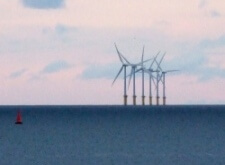 Ofgem have refused RWE, the owners of perennial problem supplier nPower, request for ‘compulsory rights of entry’ to enable them to lay cables from offshore wind installations to the mainland grid.
Ofgem have refused RWE, the owners of perennial problem supplier nPower, request for ‘compulsory rights of entry’ to enable them to lay cables from offshore wind installations to the mainland grid.
DECC, fresh from controversially awarding 5 of the initial 7 Contracts for Differences subsidies to offshore wind projects, will be watching with interest.
Those awards were controversial as Onshore wind is a more proven, more efficient and cheaper technology which is often located next to grid access points or is placed upon the land of owners who are happy to facilitate such a connection.
Onshore wind however is not popular with the Conservative administration because of NIMBYISM.
Now though that defiant prejudice preventing the development of and additional support for onshore wind could end up wreaking far more havoc on areas than the maligned ‘blot on the landscape’ wind turbines ever would.
This is because to get the electricity from the Offshore wind farms to the National Grid entry points cables must be laid across completely unrelated areas which have no connection to, nor gain any direct benefit from the Offshore wind installation. A situation that is the absolute opposite of that experienced with onshore wind.
RWE was planning to put up 288 wind turbines in a new farm 20 miles off the coast of Lincolnshire. To do this and render them operationally effective they needed to assess various landowners’ property for suitability for cabling, substations and the regular inspection areas required to deliver power to the grid.
Unsurprisingly landowners were neither amused nor cooperative.
As a result RWE applied to Ofgem to gain compulsory access to the land to carry on regardless.
Ofgem however found fault in RWE’s claim that under the Electricity Act this right was enshrined.
Ofgem pointed out to RWE that this clause is intended to ensure an unfettered ability to extend an existing generation installation and that laying cables onshore from an offshore wind installation could not be categorised as such an extension.
Whilst a final decision from Ofgem is pending, and recent experience tells us consistency cannot be guaranteed where Ofgem is concerned, this finding has a potential to seriously undermine the UK government’s hopeful investment in Offshore wind as the least controversial source of new energy.
Together with trespassing concerns for the fracking industry this revolt of the landowner underlines the need for far more joined up thinking amongst all parties when it comes to UK energy policy. Yet again homework hasn’t been done and an expensive folly or diminished property rights will inevitably result.
